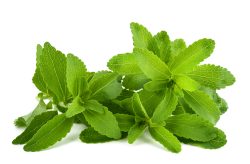 Lyme disease is a tough nut to crack, with its ability to shape-shift and defy conventional antibiotics. But what if there was a safer and more effective solution? Enter Stevia rebaudiana, commonly known as stevia, a natural plant that could hold the key to combatting this increasingly prevalent infection.
Lyme disease is a tough nut to crack, with its ability to shape-shift and defy conventional antibiotics. But what if there was a safer and more effective solution? Enter Stevia rebaudiana, commonly known as stevia, a natural plant that could hold the key to combatting this increasingly prevalent infection.
In 2015 a groundbreaking preclinical study discovered that whole stevia leaf extract possesses extraordinary antibiotic properties against Borrelia burgdorferi, the culprit behind Lyme disease. What’s more, this study revealed that the mighty stevia extract can take on all known morphological forms of B. burgdorferi, making it a formidable weapon in the fight against this stubborn disease.
B. burgdorferi, the bacterium responsible for causing Lyme disease, possesses a fascinating and diverse life cycle. It can even exist as an L-form, which lacks a cell wall. But what makes it truly fascinating is its ability to enter a dormant state, making detection via polymerase chain reaction a challenge. And as if that wasn’t impressive enough, it also boasts high antibiotic resistance in the form of biofilms.
The recent study reveals that a significant percentage of patients suffer from adverse health effects even after receiving antibiotics for the recommended treatment duration. These effects can include debilitating fatigue, joint and muscle aches, and pain lasting over six months and present a serious challenge to medical professionals. While the destruction of beneficial gut microbes by antibiotics could contribute to these symptoms, there is also a disturbing possibility that the drugs push antibiotic-resistant forms of the disease deeper into the body, aggravating the condition. In light of the difficulties in eradicating B. burgdorferi using traditional antibiotics, researchers have turned to stevia as a potential antimicrobial.
While Stevia may not be traditionally recognized for its antimicrobial properties, all plants have natural defense systems that shield them from infection. By ingesting Stevia, you can tap into these protective attributes for your own benefit. The leaf extract of Stevia is packed with numerous phytochemicals. These compounds have been proven to combat a wide range of pathogens with their antimicrobial prowess.
The results of the study found stevia leaf extract proved to be a highly effective agent in reducing the forms of this stubborn bacteria. Unlike the individual antibiotics which actually increased the mass of the most antibiotic-resistant form of B. burgdorferi, Stevia successfully decreased the biofilm mass by an impressive 40% on both plastic and collagen surfaces. This natural product could be the key to combating B. burgdorferi effectively.
Although stevioside, a compound derived from the stevia plant, does not possess antimicrobial properties against B. burgdorferi or resistant cells, its potential as a medicinal treatment is not lost. This implies that popular stevia products made from this extract lack the medicinal benefits provided by the entire herb extract. This finding aligns with the well-established notion in natural medicine that the collective effect of a whole substance cannot be replicated by its individual components, nor is the therapeutic value of the whole equivalent to the sum of its parts.
While this study is preliminary and cannot be taken to mean that consuming whole stevia extract will yield clinical improvements comparable or superior to conventional antibiotics, it does pave the way for future research in this area. With stevia as a potential game-changer, there’s hope for a safer and more effective treatment. This groundbreaking study opens up a new avenue for Lyme disease treatment.
To view the original scientific studies click below:
Effectiveness of Stevia Rebaudiana Whole Leaf Extract Against the Various Morphological Forms of Borrelia Burgdorferi in Vitro





